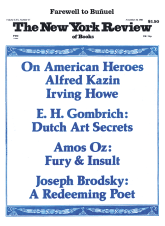In response to:
International Episodes from the September 29, 1983 issue
To the Editors:
With characteristic intellectual dishonesty, Conor Cruise O’Brien writes in your issue of September 29 that I had signed a letter to the New York Times “rebutting the charge that the [Congress for Cultural Freedom] was paid for by the CIA” while knowing at the time and admitting thereafter that the charge was true.
This is a falsehood. The letter to the Times (May 9, 1966), which I signed with John Kenneth Galbraith, George Kennan and Robert Oppenheimer, did not rebut or even discuss the CIA charge. It was addressed to quite another point and simply affirmed that the signers had no question about the independence of the Congress’s policy. As Christopher Lasch wrote in the Nation (September 11, 1967), the letter “completely avoided the question of Encounter’s financing and merely argued that the magazine’s editorial independence proved that it had never been ‘used’ by the CIA.” Actually the letter dealt not with Encounter, but with the Congress in general; otherwise Lasch’s sentence is accurate.
In his article O’Brien suggests that the letter was a lie because I knew when I signed it about the CIA subvention. Since the letter said nothing at all about CIA financing, the lie is O’Brien’s. O’Brien’s claim that he asked me, “Did you not know, when you signed that letter, that the CIA paid for the congress?” represents, to put it charitably, a considerable lapse of memory. At any rate a pontificator who can’t get his facts straight would be well advised to abstain from pompous lectures about the moral obligations of intellectuals.
Arthur Schlesinger, Jr.
New York, New York
Conor Cruise O’Brien replies:
Mr. Schlesinger is correct in saying the letter to the Times did not use the words “paid for by the CIA,” but he is quibbling. The letter in question begins by saying that the signatories “wish to comment on the suggestion in The Times news article of April 27 that the congress has been used by the Central Intelligence Agency.” They go on to “say categorically that we have no question regarding the independence of its policy, the integrity of its officials or the value of its contribution. In our experience the congress, under the direction of its Secretary-General, Nicholas Nabokov, has been an entirely free body, responsive only to the wishes of its members and collaborators and the decisions of its Executive Committee.” No one who read that letter could have read it as anything else but an implicit rebuttal of the suggestion on which the signatories were commenting. My memory of the question I put to Mr. Schlesinger in the televised debate is quite clear, and so I imagine is his.
The charge of intellectual dishonesty, coming from Arthur Schlesinger, will not cause me any loss of sleep.
This Issue
November 10, 1983



